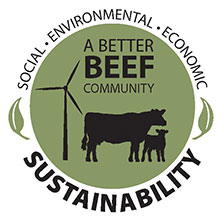Beef Sustainability Assessment Documents Industry Progress
Effort to measure the sustainability of the entire supply chain puts industry in position to lead conversations about industry sustainability.
News release by Cattlemen's Beef Board
TAMPA, Fla. (Feb. 6, 2013) — Participants at the 2013 Cattle Industry Convention gathered Feb. 6 to
hear the results of the first-ever Beef Industry Sustainability
Assessment. The assessment, which was funded by the Beef Checkoff
Program, marks the first time any industry has ever measured the
sustainability of its entire supply chain. This important work positions
the beef industry to lead the conversations about industry
sustainability.
 “Sustainability is, in fact, a journey. This particular journey
started two years ago when the Beef Promotion Operating Committee
decided to fund the sustainability assessment project,” said Richard
Gebhart, an Oklahoma cattleman and vice chairman of the checkoff's
Producer Communications Working Group. “Raising cattle in a sustainable
way has been important to the cattle industry for a long time, but this
is the first opportunity we have had to use science to tell that story.”
“Sustainability is, in fact, a journey. This particular journey
started two years ago when the Beef Promotion Operating Committee
decided to fund the sustainability assessment project,” said Richard
Gebhart, an Oklahoma cattleman and vice chairman of the checkoff's
Producer Communications Working Group. “Raising cattle in a sustainable
way has been important to the cattle industry for a long time, but this
is the first opportunity we have had to use science to tell that story.”
The Beef Sustainability Assessment was conducted by the National
Cattlemen’s Beef Association (NCBA), a contractor to the Beef Checkoff
Program. BASF Corporation and the USDA Agricultural Research Service (ARS) played integral roles as
subcontractors to assemble and interpret the data required to conduct
the assessment.
“This comprehensive analysis will provide a roadmap for the journey
toward a more sustainable beef industry,” said NCBA Director of
Sustainability Kim Stackhouse-Lawson. “The U.S. beef industry is one of
the most complex biological, economic and social supply chains in the
world. As such, measuring these complex, interrelated systems is
difficult but critically important to the future stability and
profitability of the industry.”
A sustainable beef industry is critically important as we work toward
the goal of feeding 9 billion people by the year 2050, a global
population explosion that experts estimate will require at least 70%
more food with few additional resources.
“For the beef industry, sustainability has been defined as the
process of meeting beef demand by balancing environmental
responsibility, economic opportunity and social diligence throughout the
supply chain,” said Stackhouse. “By ensuring that these three
pillars of beef production are balanced, the industry will be well-positioned to continue future growth.”
According to Stackhouse, the beef industry has made
significant improvement toward a more sustainable future over time.
Despite the current rate of progress, the beef industry’s path toward
continuous progress is never-ending.
“Sustainability is a journey and there’s really no end point to this work,” she explained. “We can always be more sustainable than we are today. That’s what we’re working toward, that continuous improvement that will make us better over time."
Get more by checking out a video demonstrating the results on the MyBeefCheckoff YouTube page at Sustainability Video; and view the research results directly at Sustainability Research. For more information about the beef checkoff, in general, visit MyBeefCheckoff.com.
-------------------------
Editor’s Note: This article is adapted from a news release by the CBB. For more information and the original release, visit www.beefboard.org.
The Beef Checkoff Program was established as part of the 1985 Farm Bill. The checkoff assesses $1 per head on the sale of live domestic and imported cattle, in addition to a comparable assessment on imported beef and beef products. States retain up to 50¢ on the dollar and forward the other 50¢ per head to the Cattlemen's Beef Promotion and Research Board, which administers the national checkoff program, subject to USDA approval.

